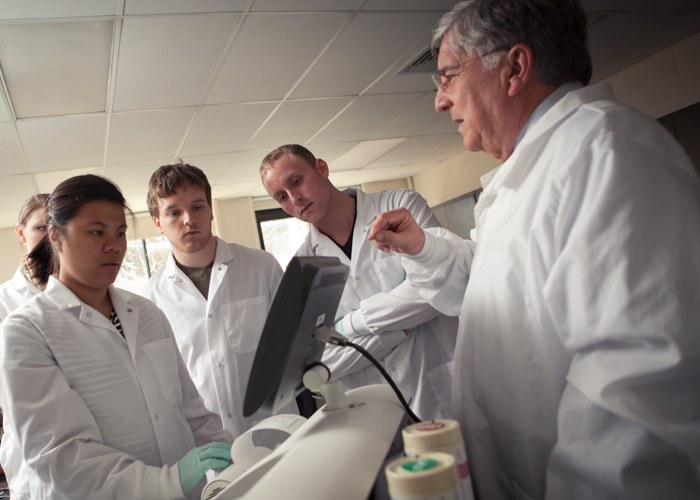We are fortunate to be guided by some of the best and brightest minds in research and clinical care, as well as courageous survivors who inspire all of us at the SRC daily. Thank you for your contributions to help us become the destination of excellence for stroke rehabilitative care and innovations and for providing hope for a better future for stroke survivors, their families and friends.
The Stroke Survivor Recruitment Database (SSRD)
Investigator: Matt Durand, Ph.D.
Advancements in stroke rehabilitation through research are not possible without stroke survivors who are willing to participate in research studies. The Stroke Rehabilitation Center has created a searchable database so study investigators can contact potential research subjects to participate in their studies. Stroke survivors are recruited from Froedtert Hospital's inpatient units and Physical Medicine and Rehabilitation and Neuroscience outpatient clinics. The SSRD is a secure, IRB-approved database. If you are an investigator interested in recruiting subjects from our database, or a stroke survivor interested in learning more, please contact Rachel Minkin at rminkin@mcw.edu.
The Functional Outcomes Toolkit Study
Investigator: John R. McGuire, M.D.
The SRC is standardizing the way we measure functional status of stroke survivors as they progress through rehabilitation. The Functional Outcomes Toolkit consists of a panel of validated outcome measures in motor, sensory, cognitive and psychosocial function, giving clinicians the power to reliably measure the impact of a rehabilitation intervention on functional outcomes over time. This study is in pilot phase and is currently enrolling stroke survivors. We are always interested in partnering with community clinics to apply the Toolkit at your site. Please contact Rachel Minkin at rminkin@mcw.edu for more information.
Ischemic Preconditioning as an Intervention to Improve Stroke Rehabilitation
Investigators: Allison Hyngstrom, PT, Ph.D. and Matthew Durand, Ph.D.
Ischemic preconditioning (IPC) is a well-studied, well-tolerated intervention during which blood flow to a certain part of the body is temporarily cut off using a blood pressure cuff. In multiple studies, IPC has been shown to improve regional blood flow, motor neuron activity and muscle function. Because IPC targets three different systems, all of which are affected by stroke, we hypothesize that repeated sessions of IPC during the first days to months following a stroke will make traditional impatient rehabilitation strategies more effective. In a previous study in our lab, we have shown that IPC can be effective in chronic stroke survivors (people who suffered a stroke at least six months ago) and we are now exploring the effects of IPC while a stroke survivor is still in the hospital.
Identifying the Effects of Botox Therapy on Brain Connectivity in Stroke
Investigators: John McGuire, M.D. and Brian Schmit, Ph.D.
For many stroke survivors, botulinum neurotoxin (Botox) injection therapy can be extremely helpful in relieving muscle tightness and improving movement and overall physical function. In a series of previous studies in our lab, we have begun to learn more about the connections within the brain and how they are altered after a stroke. The purpose of this study is to identify changes in these connections in response to Botox therapy in stroke survivors. Clinically, it can be difficult to determine how much brain function is actually masked by muscle tightness and how much brain function was permanently lost because of the stroke. We hypothesize that changes in brain connections (using MRI) before and after Botox injections will correlate with improvements in arm functions.
A New Training Paradigm to Reduce Motor Compensation During Pedaling in Subacute Stroke
Investigator: Sheila Schindler-Ivens, PT, Ph.D.
Motor compensation after stroke is a behavior in which the unaffected limb performs tasks that are normally accomplished with the affected limb. For example, stroke survivors with right-sided weakness often bear weight exclusively on the left leg when rising from a chair. Compensation provides some benefit to stroke survivors, in that it allows them to perform tasks with slightly less difficulty. However, compensation may limit recovery of the weak leg. Studying compensation during walking is rather difficult because walking requires simultaneous use of both legs to remain upright while moving forward. If researchers eliminated the strong leg to remove compensation, the subject would fall. In previous studies in our lab, we have used pedaling as a model for compensation during walking. We have shown that brain activity is altered during pedaling in stroke survivors. In this study, subjects will be trained to decrease compensation while pedaling on a device with small motors assisting the movement of each leg just enough the keep the pedals rotating how they should. We hypothesize that activation in certain parts of the brain will increase as compensation decreases.


